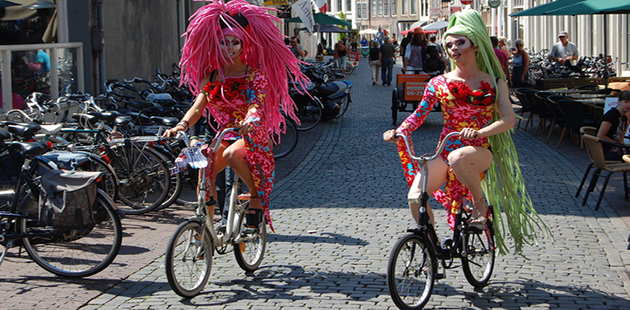 To her fans and friends in the Australian LGBT community, her name is Roma Therapy. But that’s not how she’s known on Facebook. Roma is one of thousands of queer performers who have been affected by Facebook’s crackdown on drag queens who don’t abide by its “real names” policy. Either they use the name on their driver’s licence, or their accounts are being shut down.
To her fans and friends in the Australian LGBT community, her name is Roma Therapy. But that’s not how she’s known on Facebook. Roma is one of thousands of queer performers who have been affected by Facebook’s crackdown on drag queens who don’t abide by its “real names” policy. Either they use the name on their driver’s licence, or their accounts are being shut down.
So yesterday, on her birthday, messages began appearing on Roma’s wall addressed not to the name she’s widely known under but to “John”. Facebook let her keep her account but deleted her online identity instead. According to Facebook, using real names prevents harassment. But to many in the LGBT community, the policy is itself an act of intimidation because it violates their right to define who they really are.
“What’s so upsetting is Facebook’s claim of “realness” – that somehow your legal name is your most real one,” says Glace Chase, a New York-based Australian performer and playwright who writes under the name Rick Viede.
I am Glace, I introduce myself as that, I’ve even signed contracts as Glace. Glace to me represents my ability to transform into what I really am. My other name represents suicidal, bullied, depressed, abused. Glace represents fun, funny, the life of the party, not a victim. And Facebook wants to tell me that’s not real?
Performers aren’t the only ones affected. As singer and queer icon Justin Vivian Bond said on Facebook, many groups are at risk from the inconsistently enforced real names policy. From LGBT and gender diverse folk keeping their real names secret for their own safety, to survivors of domestic violence, to activists living under authoritarian regimes.
PhD candidate Andrew McNicol has called these groups “stranded deviations”: marginalised people who are disproportionately impacted by privacy violations, but who tend to be ignored in our discussions of privacy. We’re all affected by the wider issues at stake here, such as the ongoing context collapse in social media, but some are more affected than others.
So why is Facebook targeting drag queens so aggressively? Some have observed that the company makes money by switching people like Roma from a profile to a “page”, where they have to pay to get their posts seen.
But as researcher Grant Bollmer has pointed out, the desire for us to conform to a single fixed identity – one who freely hands over vast amounts of information about their personal life – runs deep at Facebook.
In a notorious interview, founder Mark Zuckerberg declared that “[y]ou have one identity” and wanting any more shows a “lack of integrity”. It’s no coincidence this normative framework allows Facebook to better surveil us, exploit our data, and sell targeted advertising.
This story is by no means over, however, because the queer community is pushing back hard. A mass deactivation in protest against Facebook is being planned for next month. And in recent days, thousands of LGBT people have been creating profiles on the new, hip and currently ad-free social network called Ello. It’s being called the “great gay Facebook exodus”.
Could moving platforms be the solution? Maybe, although Ello has some privacy concerns of its own (and an anti-porn policy some say is anathema to queer culture).
Perhaps, as some technology commentators have suggested, we need to stop looking for the one, true social network that fixes everything. Maybe we should regard social media as less like a marriage and more like a series of casual hookups on Tinder or Grindr. After all, when it comes to joining social networks, we are here for a good time, not necessarily a long time. As Friendster and Myspace went, so too will Facebook and Ello.
Taking a more fluid approach to social networking is not without its challenges, due in part to the phenomenon of network effects. But it could be one way to build resistance against these monolithic entities for which we spend years producing unpaid labour – only to get banned for having a colourful name.
As Canadian drag queen Billy L’Amour said in the course of throwing some elegant shade at Facebook: “We Drag Queens were here long before you and we will be here long after you!”
Facebook’s real name policy won’t stop queers getting bullied
By Chris Rodley, University of Sydney – Chris Rodley does not work for, consult to, own shares in or receive funding from any company or organisation that would benefit from this article, and has no relevant affiliations.
This article was originally published on The Conversation. Read the original article.
Image: Henk Kosters (Flickr), CC BY-NC-SA
